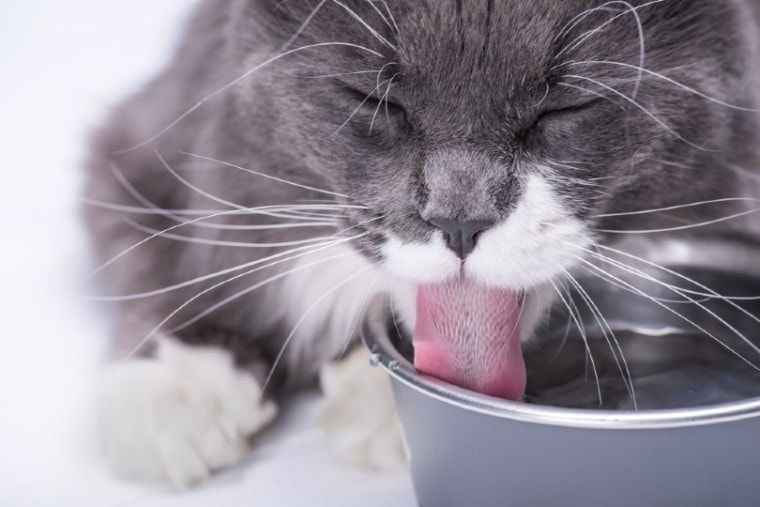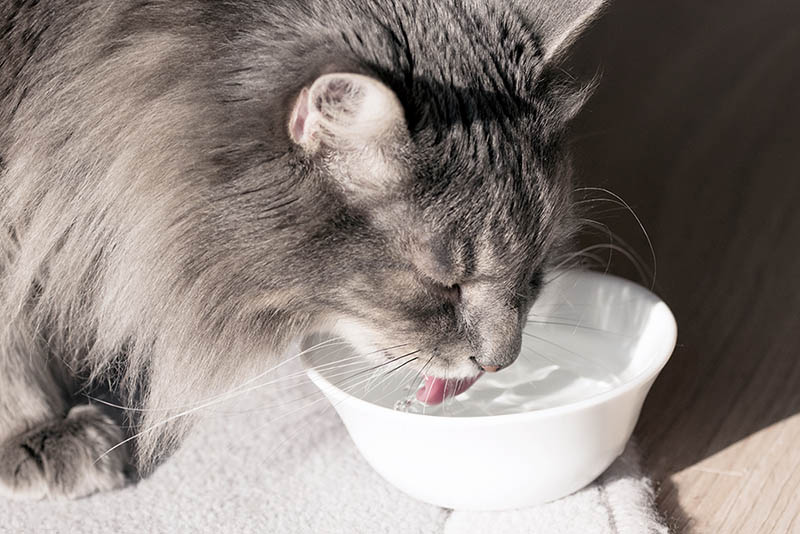
Click to Skip Ahead
As cat owners, we want what’s best for our feline friends. Given the significant role that water plays in maintaining a cat’s health, the importance of providing the right type of water cannot be overstated.
This article examines the various types of water and their suitability for cats. With the proper insight into this topic, you can ensure your kitty stays happy, healthy, and well-hydrated.
Understanding Cats & Their Hydration Needs
A cat’s hydration needs can be affected by various factors such as diet, physical activity, weather conditions, and more. As a general rule, a cat should drink approximately 4 ounces of water for every 5 pounds of its body weight.
The right balance is key, though. It’s important to maintain a proper balance of hydration to avoid health complications such as urinary tract infections, kidney stones, and metabolic issues. Both dehydration and overhydration can lead to these issues.
The 4 Best Waters for Cats to Drink
1. Tap Water
Despite being the most common and accessible water source, tap water’s suitability for cats can vary significantly depending on its quality. Many cats are instinctively drawn to running water, probably a natural inclination toward fresh, oxygen-rich water. While this makes tap water an easy choice, there are a few considerations.
Tap water can contain a range of substances, including traces of cleaning agents like bleach and other potential contaminants. If ingested over a long period, these impurities might affect your cat’s health. That said, the quality of tap water is not consistent everywhere.
In areas where tap water quality is questionable, consider using a water filter. These filters can remove many potentially harmful contaminants, providing your cat with cleaner, safer water. Remember, a cat’s water should ideally be fresh and free from harmful substances, making filtered tap water the more practical solution.

2. Bottled Water
If you’re looking for a more premium water source for your cat, bottled water might be the solution, especially those derived from underground natural reservoirs. You can usually find this information on the packaging.
However, continually buying bottled water can be expensive and may not be sustainable for everyone. An alternative could be to use tap water stored in a tightly sealed container for several hours. This allows any chlorine present to evaporate, providing your cat with safer and potentially better-tasting water.
3. Distilled Water
Distilled water is another type of water you might consider for your cat. It undergoes a process that removes all its minerals and particles, resulting in pure H2O. While this ensures it’s free from any harmful substances, it also means it lacks the beneficial minerals usually found in water.
Consequently, while distilled water can serve as a temporary water source, it shouldn’t be your cat’s main water supply. The absence of minerals might not provide the full range of hydration benefits your cat would receive from other water types.
4. Boiled Water
Boiling tap water might seem like an excellent way to get rid of any impurities, but it’s not the most beneficial choice for your feline friend. That’s because the boiling process leads to water evaporation, leaving behind a higher concentration of salts in the remaining water.
Regularly consuming water with increased salt concentrations might contribute to the development of urolithiasis. As a condition characterized by urinary stone formation, urolithiasis can lead to discomfort and potentially severe health complications for your cat. Thus, it’s generally not recommended to use boiled water as a cat’s primary source of hydration.

Encouraging Your Cat to Drink More Water
If your cat isn’t drinking enough, you can try various strategies to encourage more water consumption. Placing multiple water bowls around the house in unexpected places can spark your cat’s curiosity and increase its water intake. Switching from dry to wet food can also help, as wet food contains over 70% water.
Some cats prefer running water and might enjoy drinking from a cat water fountain. Monitoring your cat’s drinking habits can also be helpful, especially for those who tend to drink at night.
For cats, drinking water is more than just quenching thirst; it’s an activity. Many cats are fascinated by moving water, making water fountains an excellent investment for your pet’s health.
Water fountains use a quiet electric motor to ensure a constant flow of filtered, bacteria-free water. This setup not only provides a continuously fresh water source but also makes the water more appealing to your cat, encouraging them to drink more.
With their ability to filter out impurities and keep the water fresh, cat water fountains represent a superior hydration solution that can promote healthier drinking habits in cats.
Never force your cat to drink, though, and avoid offering cow’s milk as an alternative, as it can cause digestive issues. Lastly, remember to provide fresh water regularly and keep the water bowls clean.
Conclusion
Proper hydration is vital for your cat’s health, but as we’ve seen, not all water sources are equally suitable. It is important to be observant of your cat’s drinking habits and ensure they’re consuming the right amount of water.
Always consult a vet if you have any concerns about your cat’s hydration or overall health. By providing the best water and encouraging good hydration habits, you’re playing a crucial role in your cat’s health and happiness.
Featured Image Credit: Prilutskiy, Shutterstock







